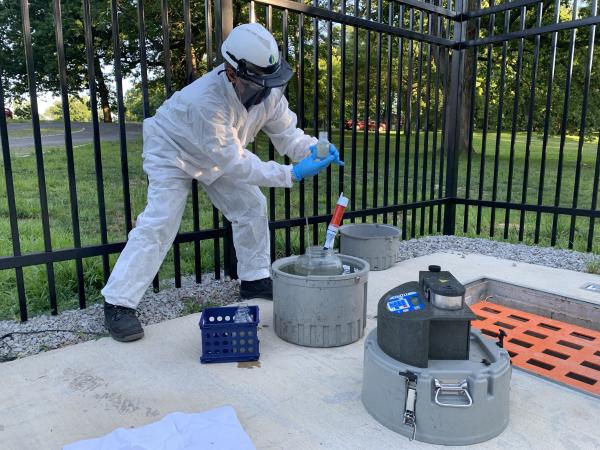
University of Louisville researchers say the current surge of COVID-19 cases in the city has revealed that testing wastewater samples provided by Louisville MSD is the most reliable way to track the presence of the disease in the community.
With COVID-19 infection rates now exceeding those of last winter’s Omicron surge period, wastewater sample testing by U of L’s Envirome Institute indicates a wider disease presence than what medical facilities are reporting from their clinical tests of patients, according to Dr. Ted Smith, director of the institute’s Center for Healthy Air, Water and Soil.
“We underestimate the true magnitude if we just look at the clinical tests,” Smith said. He explained that, with the expansion of at-home testing, many positive test results aren’t reported to government COVID-19 tracking databases like they would at a medical facility. In addition, even in medical settings, there is a lag between when a person is infected, gets tested, and that infection shows up in a report.
By contrast, Smith said, “the virus can be detected in wastewater even before an infected person begins to show symptoms and will continue to be present for the period that they are contagious. That’s why wastewater samples from eight MSD sites around the city provide a more comprehensive snapshot of COVID’s prevalence at a given moment.” In addition, he said that the same wastewater monitoring could track the appearance of seasonal flu and any other infections that can be detected in urine and stool.
Such disease detection is a broadening of the original reason sewer utilities were formed, according to MSD Executive Director Tony Parrott. “Our first task was to move wastewater away from homes and businesses to protect people’s health,” Parrott said. “That soon expanded to treating the wastewater for the health and safety of our local and downstream communities.”
Smith sees the added value this infrastructure now provides with timely information about disease risk as an expansion of the original mission of sewer utilities. “We should look first in sewers” when trying to detect the presence of new or seasonal infection threats, he said.
Parrott said, “Providing a part of the disease detection mechanism of healthcare is a logical extension of the Louisville MSD mission of providing safe, clean waterways.” MSD has been providing samples to the Envirome Institute Co-Immunity Project COVID study since the Spring of 2020.


